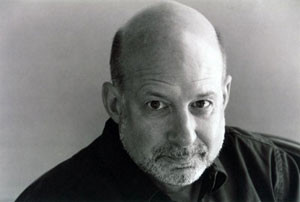

|
Stephen Dembski (December 13, 1949 - August 14, 2021) studied piano from an early age, and was reading music long before he could read words. Warned against the clarinet on account of the braces on his teeth, and against the trombone because of the length of his arms, he took up the flute in elementary school. Later, he learned musical illiteracy: in high school and after, both in America and in England, he performed folk and traditional musics on the guitar, banjo, harmonica, and washtub bass, and played a lot of rock and roll, all "by ear." While still enrolled in college, he played flute professionally in Europe for a time, worked in a small band called Kiss that played mostly prisons in Ohio, and in a big band led by Cecil Taylor. By his early twenties, he was composing music back in the old Euro-American tradition, and eventually earned degrees in it from Antioch, SUNY-Stony Brook, and Princeton. His music -- which includes instrumental, vocal, and electro-acoustic works as well as pieces for improvising musicians and for interactive installations of sound and light -- has been broadly recognized by awards and performances in both the United States and in Europe. At home, his honors include three commission-fellowships from the National Endowment for the Arts, a fellowship from the George A. and Eliza Gardner Howard Foundation, and the Goddard Lieberson Award of the American Academy and Institute of Arts and Letters; his Euro-American concert music has represented the United States at international festivals in France, Germany, Denmark, Poland, and England. In 1990, his orchestral setting of Wallace Stevens' last poem was recognized by the Premio Musicale Citta di Trieste (Italy) and recorded for compact disc by the Polish Radio and TV Symphony Orchestra. Other CD's include one on CRI and another on Music & Arts, both devoted solely to his music, a recording of his On Ondine released in 2001 in Italy, and a recording of Gregory Fulkerson's performance of his violin sonata. Dembski's music has been commissioned, performed, and recorded by such organizations as the American Composers' Orchestra, the Silesian Philharmonic of Poland, The Prism Orchestra, the 20th Century Consort, the New York New Music Ensemble, and the Pro Arte Quartet, as well as by soprano Phyllis Bryn-Julson, pianists Alan Feinberg and Ursula Oppens, violinist Rolf Shulte, and cellist Fred Sherry. Bernard Holland, writing in The New York Times, described his work in terms of "the sensuous, ecstatic quality of late Romanticism." As a flutist, Dembski was featured on the French radio, and played in a variety of European ensembles including the Paris-based l'Orchestre des Grands Concerts de la Sorbonne led by former Schoenberg pupil Max Deutsch. Now as both composer and improvising conductor, he is increasingly involved in working with musicians who come out of jazz, and appears on five CD's with the Scott Fields Ensemble. In connection with his work in compositional theory, he has designed a software package called Circles for composers' manipulation of a generalized framework of scalar and harmonic materials. He has also designed a software-hardware system called VIDI which transforms 3-D video information into MIDI information according to composer-defined criteria, to enable a non-intrusive interactive installation of sources of sound and light. Among other projects, he's currently working on a piece, for percussionist Daniel Druckman, to celebrate the twenty-fifth anniversary of the New York New Music Ensemble, a CD-length composition for five improvising musicians of the Scott Fields Ensemble, and an operatic setting of a libretto, Crow Soup, written for him by the renowned surrealist artist and novelist Leonora Carrington with her son, Gabriel. |
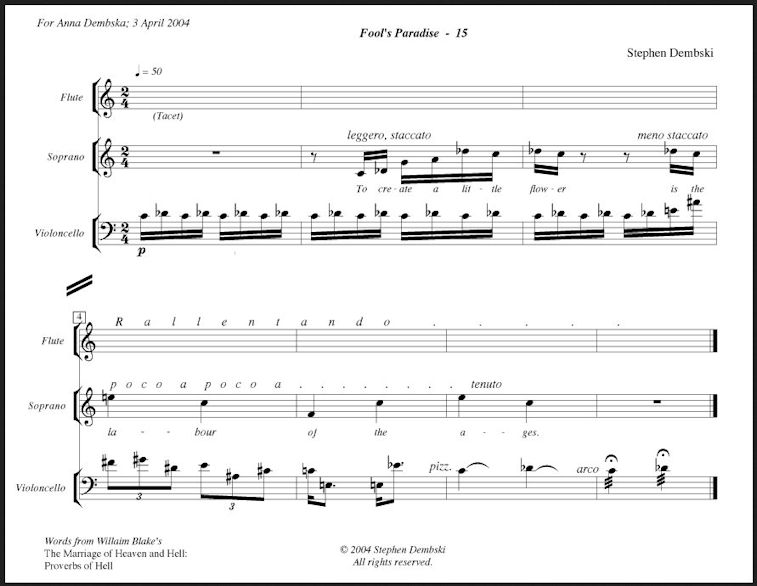
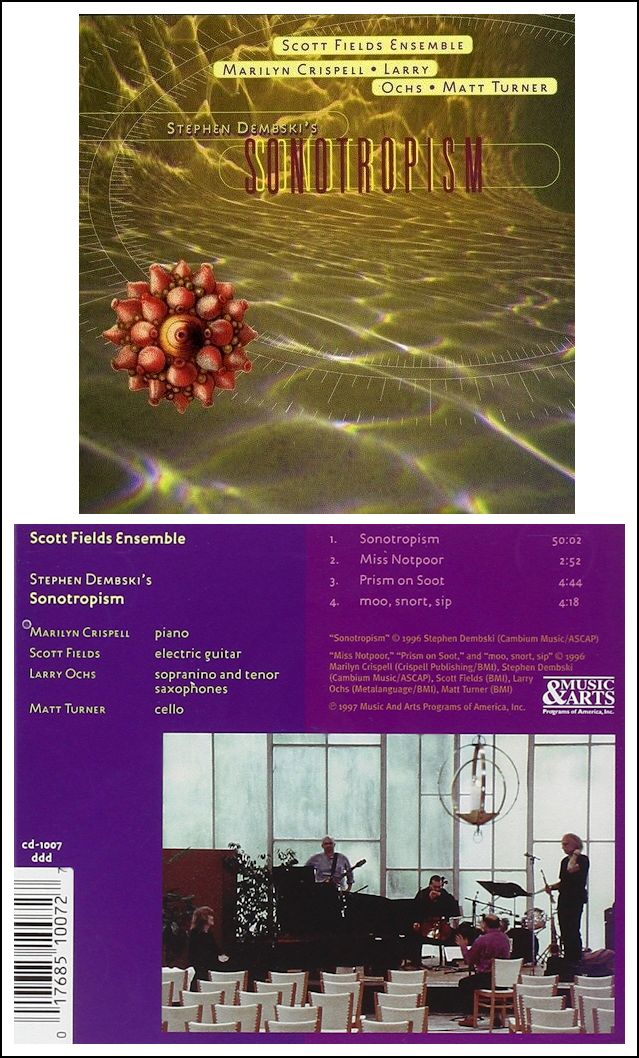 BD: Does it surprise you that there
would be someone who would be creating a unique universe that is similar
to your unique universe?
BD: Does it surprise you that there
would be someone who would be creating a unique universe that is similar
to your unique universe?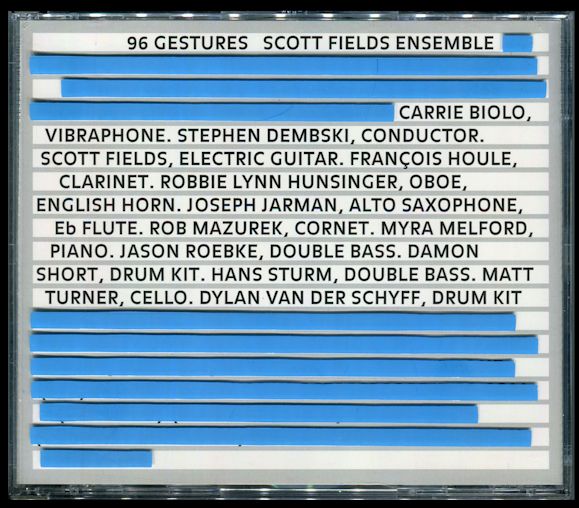 Dembski: It depends. If we’re talking about the
pieces that I was mentioning where the conductor is not so much improvising,
then yes. If we’re talking about pieces where there isn’t anything
that we usually understand, and improvisation is involved, then I say
that in those couched terms. I would imagine every time a performer
isn’t really playing, where they’re improvising some aspects, the rubato
and various dynamic shadings touch. All the material is improvisation
as far as I’m concerned, so it’s just a question of the extent and the
domains in which you’re improvising. However, if we’re talking about
a kind of piece where the conductor is actually improvising, then they
would have to listen to at least three performances before they get an
idea that they were even listening to the same piece. In fact, that’s
one reason that when we put out one of these pieces, it was a 3-CD set
[shown at left]. This was the biggest of them, which was actually
not written by myself, but which I conducted as an improvising conductor.
That really makes me, in a sense, a composer, because I’m determining
how the piece goes as opposed to what is being made from the ideas. The
piece itself was written by Scott Fields, and was done by his ensemble
and produced by him. Most of these improvisation projects that I’m
talking about are due to his production and instigation. But in those
cases, and in this case in particular, we insisted for a commercial CD that
it came out on three CDs. We put it out on CRI, and their catalog
has now been moved over to New World, but should still be readily available.
I talked administrators at New World just a few weeks ago, and they
said things are going very well.
Dembski: It depends. If we’re talking about the
pieces that I was mentioning where the conductor is not so much improvising,
then yes. If we’re talking about pieces where there isn’t anything
that we usually understand, and improvisation is involved, then I say
that in those couched terms. I would imagine every time a performer
isn’t really playing, where they’re improvising some aspects, the rubato
and various dynamic shadings touch. All the material is improvisation
as far as I’m concerned, so it’s just a question of the extent and the
domains in which you’re improvising. However, if we’re talking about
a kind of piece where the conductor is actually improvising, then they
would have to listen to at least three performances before they get an
idea that they were even listening to the same piece. In fact, that’s
one reason that when we put out one of these pieces, it was a 3-CD set
[shown at left]. This was the biggest of them, which was actually
not written by myself, but which I conducted as an improvising conductor.
That really makes me, in a sense, a composer, because I’m determining
how the piece goes as opposed to what is being made from the ideas. The
piece itself was written by Scott Fields, and was done by his ensemble
and produced by him. Most of these improvisation projects that I’m
talking about are due to his production and instigation. But in those
cases, and in this case in particular, we insisted for a commercial CD that
it came out on three CDs. We put it out on CRI, and their catalog
has now been moved over to New World, but should still be readily available.
I talked administrators at New World just a few weeks ago, and they
said things are going very well.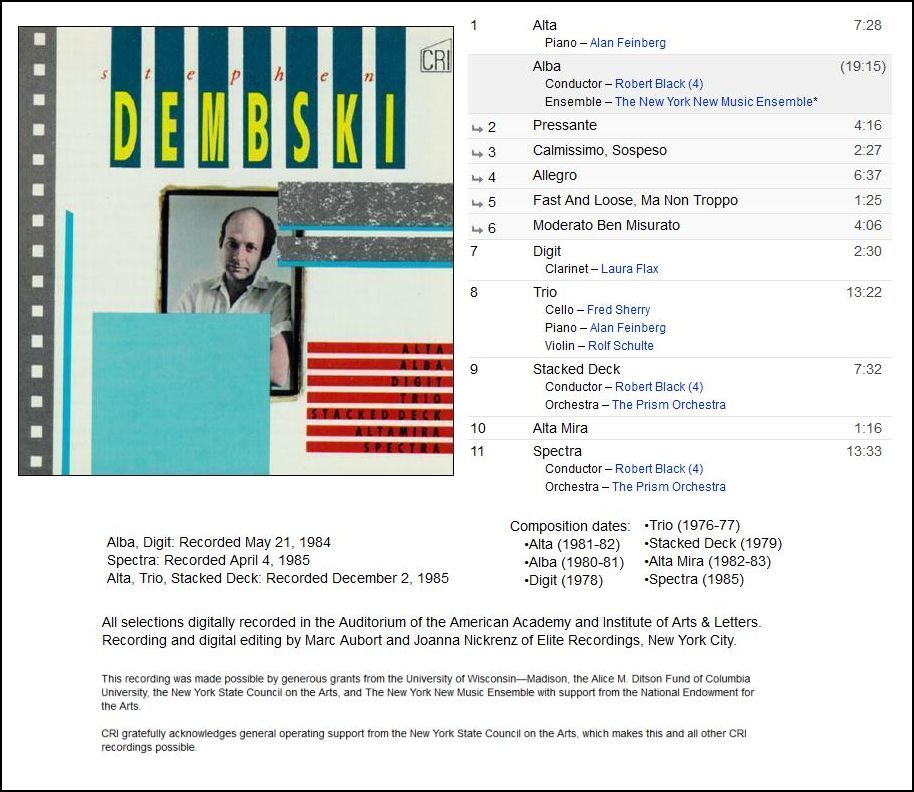
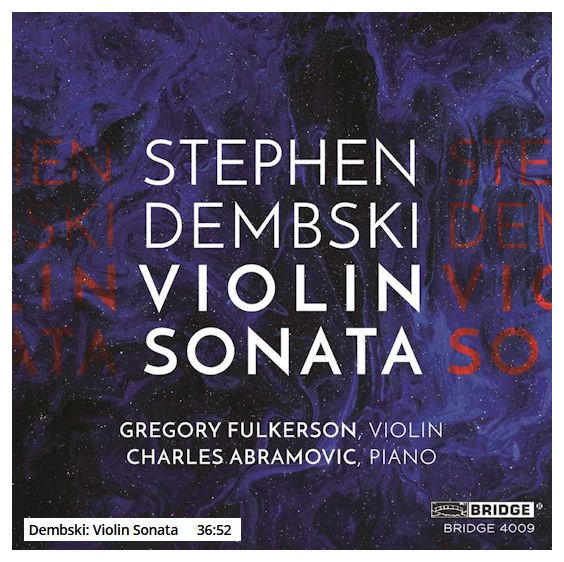
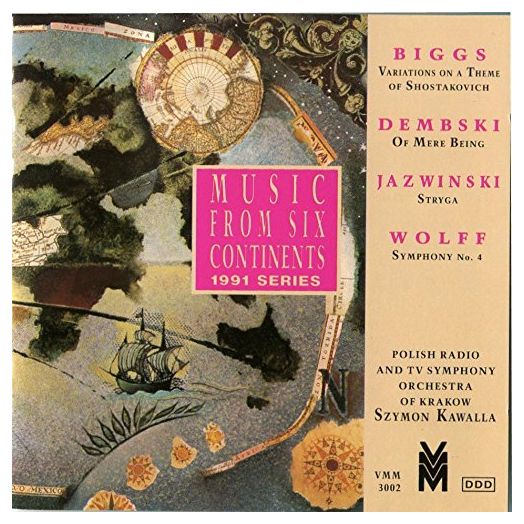
© 2005 Bruce Duffie
This conversation was recorded in Chicago on March 13, 2004. Portions were broadcast on WNUR the following year. This transcription was made in 2020, and posted on this website at that time.
To see a full list (with links) of interviews which have been transcribed and posted on this website, click here. To read my thoughts on editing these interviews for print, as well as a few other interesting observations, click here.
Award - winning broadcaster Bruce Duffie was with WNIB, Classical 97 in Chicago from 1975 until its final moment as a classical station in February of 2001. His interviews have also appeared in various magazines and journals since 1980, and he now continues his broadcast series on WNUR-FM, as well as on Contemporary Classical Internet Radio.
You are invited to visit his website for more information about his work, including selected transcripts of other interviews, plus a full list of his guests. He would also like to call your attention to the photos and information about his grandfather, who was a pioneer in the automotive field more than a century ago. You may also send him E-Mail with comments, questions and suggestions.